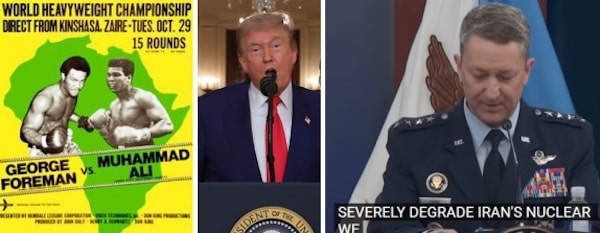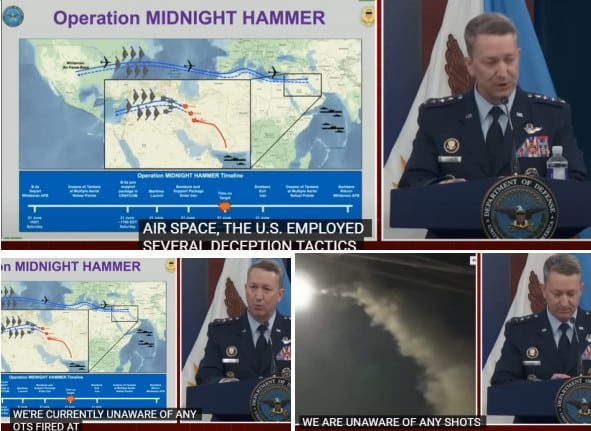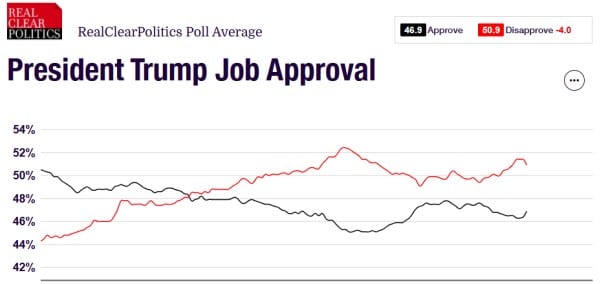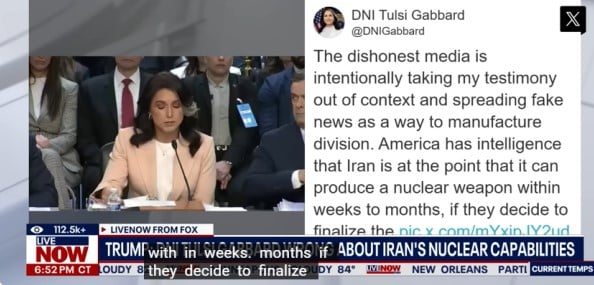When Muhammad Ali famously demonstrated the rope-a-dope strategy in the Zaire title bout against George Forman in October 1974, he allowed Foreman to start attacking him against the ropes in Round 3. By Round 7 Foreman had exhausted his punching strength. In Round 8, Foreman dropped his guard, and Ali counterattacked with a combination of punches which knocked Foreman out.
Watch carefully how it was done in seven punches, eight seconds.
According to General Daniel Caine, Chairman of the Joint Chiefs of Staff, the U.S. has knocked out Iran’s nuclear enrichment and nuclear weapon preparation plants with “extremely severe destruction”; “completely and totally”, according to President Donald Trump.
The punches were delivered by “tactical surprise”, Caine has announced, with a “deception effort known only to an extremely small number of planners and key leaders here in Washington.” He said the “strike packages” comprised more than 125 aircraft and one submarine. They fired 16 GBU-57 Massive Ordnance Penetrator (MOP) bombs, more than 24 Tomahawk missiles, and a total of 75 precision-guided weapons at three land targets—Fordow, Natanz, and Isfahan. According to Caine’s report, no Iranian shot was fired against the U.S. attackers as they flew on to these targets nor “on the way out.” Instead, “decoys” and “preemptive suppressing fires” were launched. “Iran’s fighters did not fly,” Caine claims,
and it appears that Iran’s surface-to-air missile systems did not see us. Throughout the mission we retained the element of surprise.
The entire operation took 25 minutes. That’s the equivalent in the boxing ring of seven rounds. Iran reports the U.S. had telegraphed its punches with advance notice that the bombing raid would be restricted to the three land targets.
Knocking out the Iranian leadership, including military and civilian leaders, plus Ayatollah Ali Kamenei, has been denied by Vice President JD Vance, then reasserted by Trump.
“No other military in the world,” said Caine,
could have done this.
Iran has not acknowledged that rope-a-dope is its warfighting strategy. As Foreign Minister Abbas Araghchi prepares for his meetings on Monday with Russian officials, including President Vladimir Putin, the Islamic Revolutionary Guards Corps (IRGC) has issued a warning to Russia and China that they are failing to do enough to meet longstanding assistance promises and treaty obligations. “We may forget the words of our enemies, but never the silence of our friends,” the IRGC media platform Sepahi News has announced just after midnight on Monday morning (June 23). “After going through this sensitive situation, there will undoubtedly be a serious review of relations with some countries.” The text was accompanied by a picture of Putin and China’s President Xi Jinping together at a ceremony shaking hands.
The former Russian President Dmitry Medvedev, spokesman for the Security Council, has issued a personal declaration supporting Iran’s war against both the U.S. and Israel, and implying not only that Israel is losing the war, but also there is Kremlin backing for the Iranian nuclear weapons programme.
The critical infrastructure of the nuclear cycle appears not to have been damaged or even slightly affected. The enrichment of nuclear materials, and now we can say it, the future production of nuclear weapons, will continue. A number of countries are ready to directly supply Iran with their nuclear ammunition. Israel is under attack–thundering explosions, people in panic. The United States is drawn into a new conflict with the prospect of a ground operation. The Iranian political regime has been preserved, and with a high degree of probability it has become stronger.
“With such successes,” added Medvedev for the General Staff and intelligence services,
[we don’t see] Trump [winning] the Nobel Peace Prize, despite the utter venality of this nomination. Good start–congratulations, Mr. President!
This is Russian for rope-a-dope.
In this ring, here is the U.S. cornermen’s score:
Here is the Iran cornermen’s score, according to an independent intelligence assessment at general rank:
Iran has fissile material ranging from 80% to 90% enrichment. They have created casing for packing the fissile material and only need to insert the ball to create the desired over-pressure. Cold testing has been done with the help of North Korea, facilitated possibly by China. Additionally, they believe that if push comes to shove, they could create low-yield weapons ranging from five to twenty kilotons. Also, the enriched uranium had been shifted before the attack, and it is not difficult to start the centrifuge process again. Consequently, it seems the U.S. targeting may not have delivered the results desired. At best, the programme has been crippled but nowhere near obliterated as claimed by Trump. Insofar as its options are concerned, Iran is unlikely to open a front against the U.S. just yet. It will concentrate its attacks on Israel, making it look weak and vulnerable.
Here is the ringside score:
U.S. voter approval. Russian and Iranian commentaries claim the success announced by Trump, Caine and other Washington officials is a public relations stunt for U.S. voters. The commentaries fail to admit that this is succeeding. In the President’s job approval polls, the inflection point which the White House sees in the average of the negative disapproval gap–when disapproval began declining and approval rising–came on April 27. At that time disapproval of Trump’s performance was 52.4% and approval 45.3%; the negative gap was 7.1 percentage points. Since then this gap has now shrunk to 4 points.
From a closer analysis of the polls, it can be seen that the disapproval of Trump’s foreign policymaking is significantly worse than his overall rating—10 points in negative spread. The domestic drivers of disapproval—inflation and economic policy as a whole—are also generally worse for Trump, his rating on immigration generally better. So Trump’s behaviour must be seen as playing to his strengths and diverting attention from his weaknesses. However, the military attack on Iran is not the end of MAGA nor the end of the Trump Adminstration, as the alt-media commentators have been celebrating. On the contrary, easy war success is exactly what Trump believes his MAGA slogan demonstrates. So far, he’s not wrong.
Internal Trump Administration dissent. There is none of significance. Instead, the purge which Trump has carried out at all the foreign policy, military and intelligence organs has succeeded. There are no damaging leaks this time round, like there were during the U.S. Air Force Yemen attack operations in March. In General Caine’s briefing, he was emphatic:
I am particularly proud of our discipline related to operational security—something that was of great concern to the President, the Secretary [of Defense Peter Hegseth], General [Michael] Kurilla [CENTCOM commander], and me, and we will continue to focus on this.—Min 8:11.
The last purportedly independent foreign policymaker in the Trump Administration, Tulsi Gabbard, the Director of National Intelligence (DNI), has proved she supports the war-with-Iran line and will accept whatever insults to her competence and character which Trump has repeated publicly.
Defeat of the Democratic Party in the war in Los Angeles. White House and Republican Party pollsters believe the outcome of Trump’s direct clash over immigration enforcement in Los Angeles has been to boost California Governor Gavin Newsom’s support as the front-running presidential candidate for the Democratic Party. However, the confrontation has increased Trump’s support among Republican and independent voters. For more analysis of Trump’s war in Los Angeles, read this.
From the Russian point of view, following analysis of these factors, the consensus conclusion among policymakers remains that there is no Russian interest to be served in criticizing and confronting Trump publicly either in person or in policy, or by proxy. At the moment, that is.
Sources in Moscow also acknowledge that President Vladimir Putin’s recent statements in St Petersburg on Israel and Iran have triggered “special sensitivity” inside the internal policy-making apparatus and this is spilling out into public debate by the military blogs, television talk shows, social media, and mainstream editorials.
Putin himself registered his sensitivity to the question, asked at the St. Petersburg Forum on Friday afternoon (June 20):
Q: What do you say to those who say or write that Russia is an unreliable ally because it hasn’t stood up for Iran? Vladimir Putin: Those who promote such narratives about Russia’s unreliability as an ally—[they are] provocateurs. They provoke the situation. But it won’t help them, they won’t achieve their goals…Please note that almost two million people live in Israel–immigrants from the former Soviet Union and the Russian Federation, [Israel] is almost a Russian-speaking country today. In the latest Russian history we must take this factor into account. That’s the first point. Second, we have traditionally developed very kind, trusting, friendly and allied relations with the Arab and Islamic world. Because we have about 15 percent of Islamic population, we are observers at the Organization of Islamic Cooperation. You know, this is also a factor…. We have a friendly relationship with Iran….In this we always fulfill all our obligations—the same thing happens on the Russian-Iranian track. We support Iran in the fight for its legitimate interests, including in the struggle for its interests in the peaceful atom. And we have always taken this position–our principled position in this case has not changed in this conflict. Who says we should have done more–what is more? Starting some kind of combat operations, or what?
The official English translation of Putin’s remarks has been delayed for release on the Kremlin website after more than 48 hours.
Putin’s statements, followed by Trump’s attack on Iran, have sharpened the debate behind the Kremlin wall on how much more time to give Trump to show his hand in the Ukraine war. If Trump is openly advocating regime change in Iran and using his military to achieve it–ask more than Moscow source–should we delay? The Americans have dropped their huge bomb on three targets in Iran. Why don’t we fire our Oreshnik at the Zelensky regime?
In rope-a-dope warfighting strategy, this is Russian for calling time.




